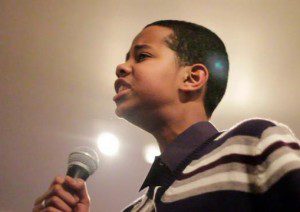
Five days from now, he and a lot of young people in Canada will wrap up their summer holidays. They’ll all be putting away their T-shirts, cut-offs and flip-flops and starting to wear school shirts and pants again. Instead of baseball gloves or tennis rackets, they’ll all be carrying their smart phones and backpacks full of textbooks again. Only this teenager I met from Toronto’s inner city, last week, has something in addition to school on his mind.
“There are friends out there who bring real benefit to your life,” he said this week, “and there are friends who don’t. It’s important to know who your real friends are.”
Last Friday, some of my colleagues at Centennial College organized a faculty retreat at the Daniels Spectrum arts centre in Regent Park, in Toronto’s Dundas and Parliament area. We looked ahead to the coming fall semester of teaching. We anticipated some of the kinds of concerns we’ll face as instructors attempting to inspire students at Centennial’s School of Communications, Media and Design, where I work.
But we also received a bit of an education about another important aspect of post-secondary school and kids and relationships. Part way through the day’s retreat, Mustafa Ahmed, a teenage resident of Regent Park stopped by to gave a recitation of his latest poem, “Close,” about one of his friends who was recently shot, not-fatally, while mixing with acquaintances Mustafa felt were doing him no good.
“You said they’re your closest friends. Closer than I am to you,” the 17-year-old said, reciting his poem. “But you still listen to friends who haven’t spoken truth. Their words have broken you. Their words have broke in you…”
Mustafa Ahmed has emerged in Regent Park area in the past couple of years as an unofficial ambassador of that former lower-income housing area of Toronto. He began writing when he was 10, offering his reflections on society and the world. And while his poetry borrows from the tradition of spoken word bordering on rap rhythms, he writes and speaks from the heart about poverty, drugs, community and violence. The shooting of his friend in his neighbourhood has moved him to call out to his peers – teenagers all around him – to make better decisions.
“Those friends of yours may be close,” Mustafa continued with his poem. “But the chambers of your heart are what they are strangers to, and when you’re trapped within the chambers of a cell… they won’t acknowledge you, because that’s what strangers do…”
I’ve long believed that one of the ways young people can ensure they stay on the right side of the law is via a buddy system. We had them when I went to school; but back then, all our parents had to worry about was a bit of pot and a few beers out behind the barn. Now the attractions are crystal meth, prostitution and maybe even illicit weapons. What Mustafa made clear in his recitation was the need for teenagers to mentor teenagers, for friends to watch out for each other – not just for what they shouldn’t do, but what they should do.
Mustafa Ahmed is no stranger to either the education system in Toronto or to his downtown neighbourhood. Indeed he has become something of a spokesman, offering his message-oriented poetry in performance to teachers of the Toronto District School Board, Children’s Aid Society, Martin Luther King memorial days, the Hot Docs festival and even a recent TEDxToronto event.
In person, Mustafa was polite, soft-spoken and respectful of everyone he met. In performance, he seemed critical, outspoken and eager to challenge his peers to be better than media tend to paint them. He recited his entire poem – about five or six minutes long – without a single note or physical prompt in front of him.
I remember writing a lot of poetry when I was Mustafa’s age. I recall when I was 16 or 17, I wrote a piece of haiku (Japanese form poetry) every single day for a year, just to test my discipline as a writer. My poetry was stiff, predictable and mired in angst and romanticism of the 1960s. Mustafa’s words have more resonance and relevance because they reflect real experience and empathy for a friend.
“Behind the ice-cold skin, we’ll remember you,” Mustafa said concluding his spoken word performance. “And we know that we are far. We are farther than they are. We are so far inside your heart, that we are better off not knowing what close means to you.”
And his message goes further than his Regent Park neighbourhood in east-end, lower-income Toronto. I think every teenager who has contemplated pulling a prank, conjuring up a lie or testing just how far he can push the law, ought to find a friend like Mustafa Ahmed to set him straight…
… because school starts Tuesday and there’ll be plenty of chances to go wrong.